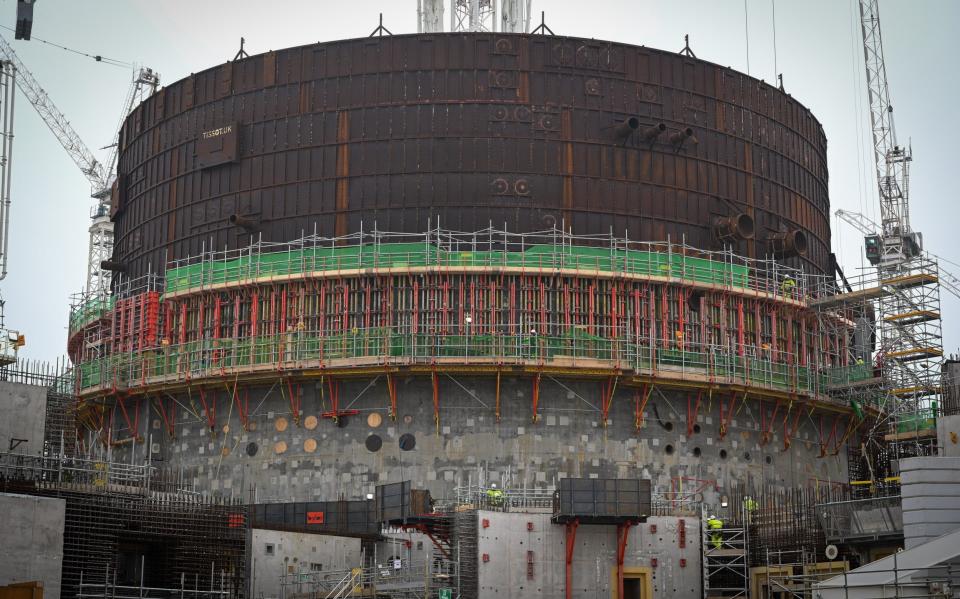Nuclear plant under threat amid ‘political opposition’ to Chinese backing, EDF warns

A new nuclear reactor plant in Essex is at risk of collapse because of political opposition to a Chinese investor’s involvement, French energy giant EDF has warned.
The Big Six energy supplier has told investors it has no obligation to keep funding the project in Bradwell, Essex, and that there is now “great uncertainty” over whether it can be delivered.
In its annual report, EDF also warned it may have to finance billions in extra funding for Hinkley Point C, Britain’s first new nuclear plant in three decades, if China refuses to participate in an investment round planned for 2023.
State-owned power company China General Nuclear (CGN) is currently developing the Hinkley plant in Somerset, Bradwell B, and Sizewell C in Somerset, under a nuclear collaboration deal between China and the UK dating back to 2015 in what was seen as a new “golden era” between the two countries.
Kwasi Kwarteng, the Business Secretary, and Boris Johnson, put nuclear power at the centre of plans to shift away from a reliance on Russian in a new energy security strategy published in April.
Mr Johnson has pledged to commission so many mini-nuclear reactors that he expects “not quite everyone having their own small modular reactors in their gardens, but close to it”.
But ministers have been plotting to remove CGN from Britain’s nuclear infrastructure amid growing concern about the emerging superpower’s involvement. Ministers are trying to secure outside investors to cut CGN out of its co-investment with EDF in Sizewell C.
EDF has now signalled political opposition to China’s investment could trigger an end to the Bradwell project. The plant has so far secured UK regulatory approval for a Chinese reactor design put forward by the joint venture company General Nuclear System (GNSL). EDF and CGN own 33.5pc and 66.5pc of the Bradwell project respectively.
In an investor report, EDF said: “There is great uncertainty around the development perspectives of the Bradwell Project, mainly related to the political opposition to a Chinese company leading a critical UK infrastructure project and from the lack of local stakeholder support.
“The risks of not being in a position to carry out the Bradwell project are high and have increased in 2021.
“EDF’s commitment to fund GNSL and Bradwell is subject to an equity cap, without any obligation to fund the project beyond the funding cap.”
The Office for Nuclear Regulation approved the use of China’s HPR1000 technology at Bradwell in February. Sources said the move gave China an incentive to end its nuclear ambitions in Britain and export its reactors elsewhere.
A source said: “CGN is only in Britain because of the opportunity to build its technology at Bradwell. There’s no other reason for it to be here.
“They could walk out of Hinkley and require someone else to buy their stake. The only other possible investor is the UK government. There are no other utility companies in Europe that would be interested and there are no other possible sources of investment.
“CGN would be happy to walk away now because what they really wanted was the endorsement of the UK safety regulator for their design so they could sell it elsewhere in the world. The Chinese have not yet succeeded in exporting any reactors.”
EDF raised the prospect of the Chinese ending further investment into Hinkley C for the first time in its annual report.
Steve Thomas, emeritus professor of energy policy at the University of Greenwich, has estimated EDF will have to contribute up to £7.7bn to fund the total cost overrun, bringing its stake to 77.6pc.
The French energy giant is expected to publish the outcome of a review of costs in the coming weeks amid delays which it has blamed on challenges including the war in Ukraine.
EDF said in its report: “The project’s total financing needs exceed the contractual commitment of the shareholders and shareholders will be asked to provide additional equity on a voluntary basis in 2023.
“This could lead the group to increase its contribution to the financing of the project from this date if its partner decided not to contribute beyond the contractual commitment.”

 Yahoo Finance
Yahoo Finance 